Vitamin C - what it is, properties, action, deficiency
Vitamin C improves wound healing, acts as an antioxidant and also delays the ageing process.


Learn more about our editorial process
.

Learn more about our editorial process
.

Learn more about our editorial process
.

Learn more about our editorial process
.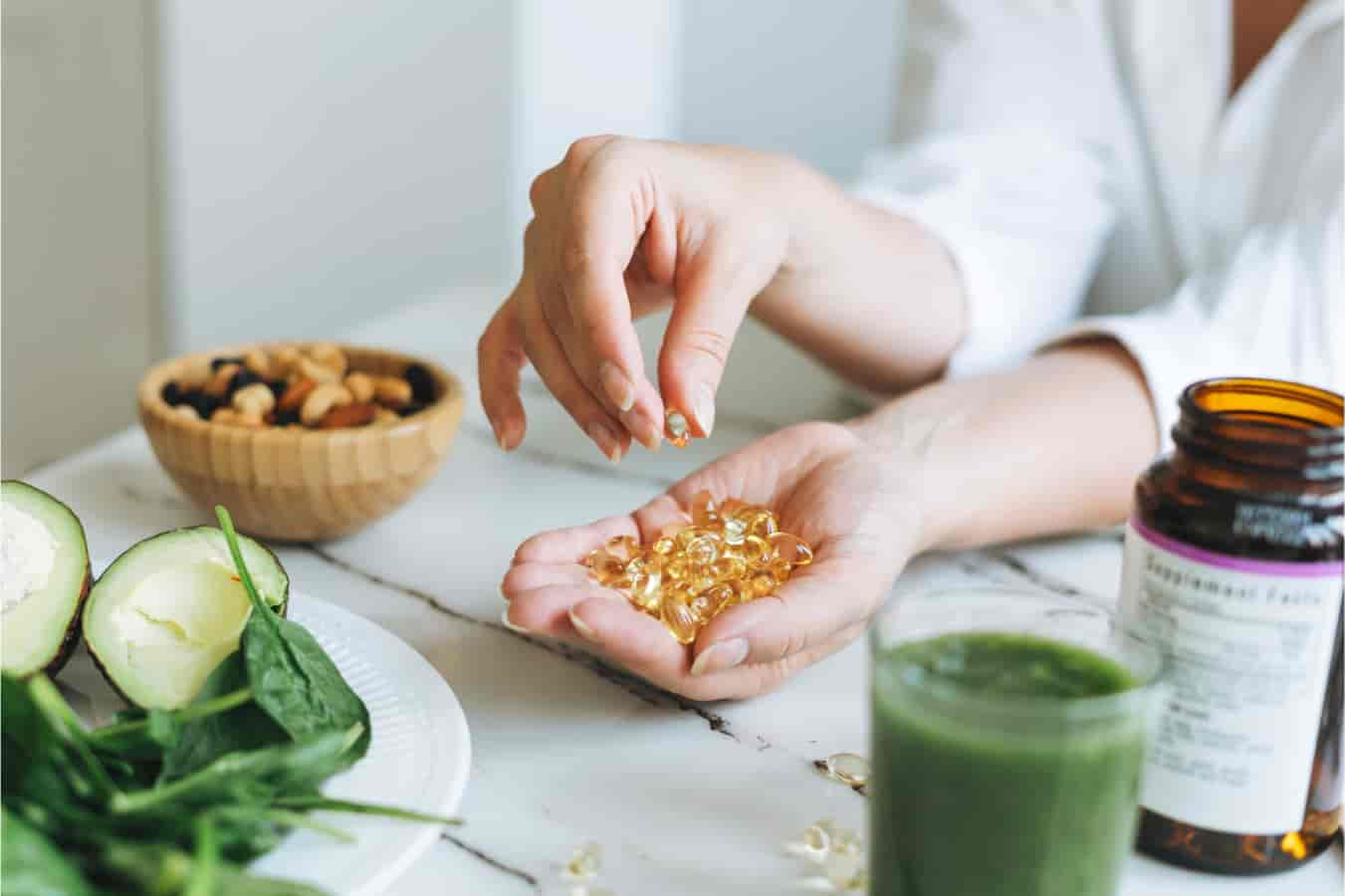
Why you can trust us
Articles on Natu.Care are written based on scientific research, data from government websites and other reliable sources. The texts are written in cooperation with doctors, nutritionists and other health and beauty experts. Articles are reviewed before publication and during significant updates.
.Learn more about our editorial process
.Information about advertisements
Content on Natu.Care may contain links to products from the sale of which we may receive a commission. When creating content, we adhere to high editorial standards and take care to be objective about the products discussed. The presence of affiliate links is not dictated by our partners, and we select the products we review ourselves completely independently.
.Learn more about our terms and Conditions
.You think the lemon is the product richest in vitamin C? There is about 100 times more of this vitamin in 100 grams of a cockatoo plum than in a standard lemon. This is valuable knowledge - most mammals produce vitamin C on their own, but humans need to supply it to the body through the diet. Why is its adequate concentration so important? In which products does it occur? What are the symptoms of vitamin C deficiency in the body? Answers to these and other questions can be found in this article.
.
Description of contents:
- What is vitamin C? .
- Properties of vitamin C? .
- In which products is vitamin C found?
- Daily requirement of vitamin C .
- Vitamin C deficiency .
- Excess vitamin C .
- Vitamin C - supplementation .
- Does vitamin C affect pregnancy .
- Vitamin C and alcohol .
- Vitamin C interactions with medications .
- Summary .
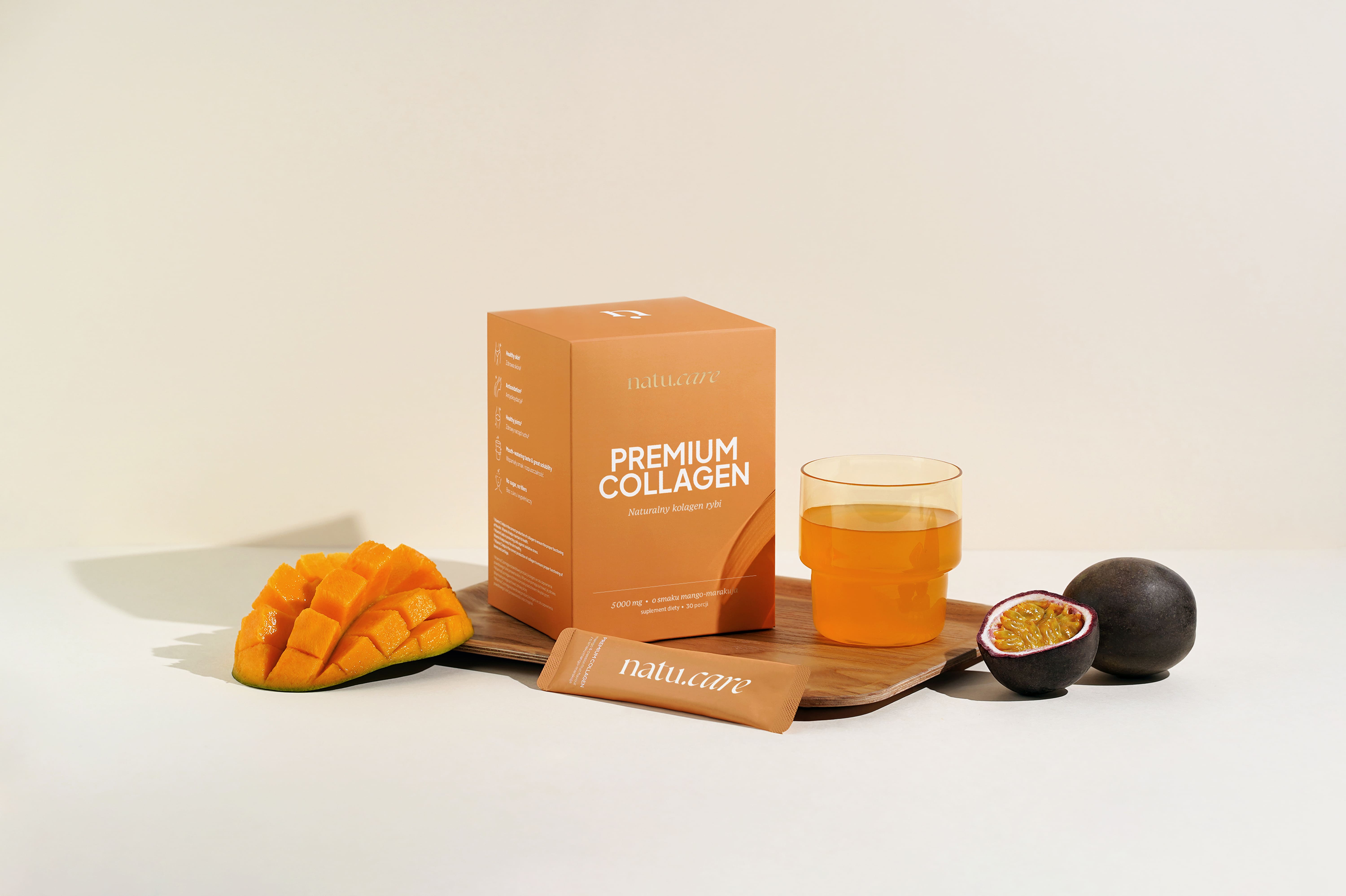
Sprawdź, za co pokochały go tysiące klientek Kolagen Premium 5000 mg, mango-marakuja
Natu.Care Kolagen Premium 5000 mg, mango-marakuja
Natu.Care Kolagen Premium dla zdrowia stawów, skóry, paznokci i włosów. Najlepsza przyswajalność. Optymalna dawka 5 000 lub 10 000 mg. Przebadany przez niezależne laboratorium.
Zobacz więcej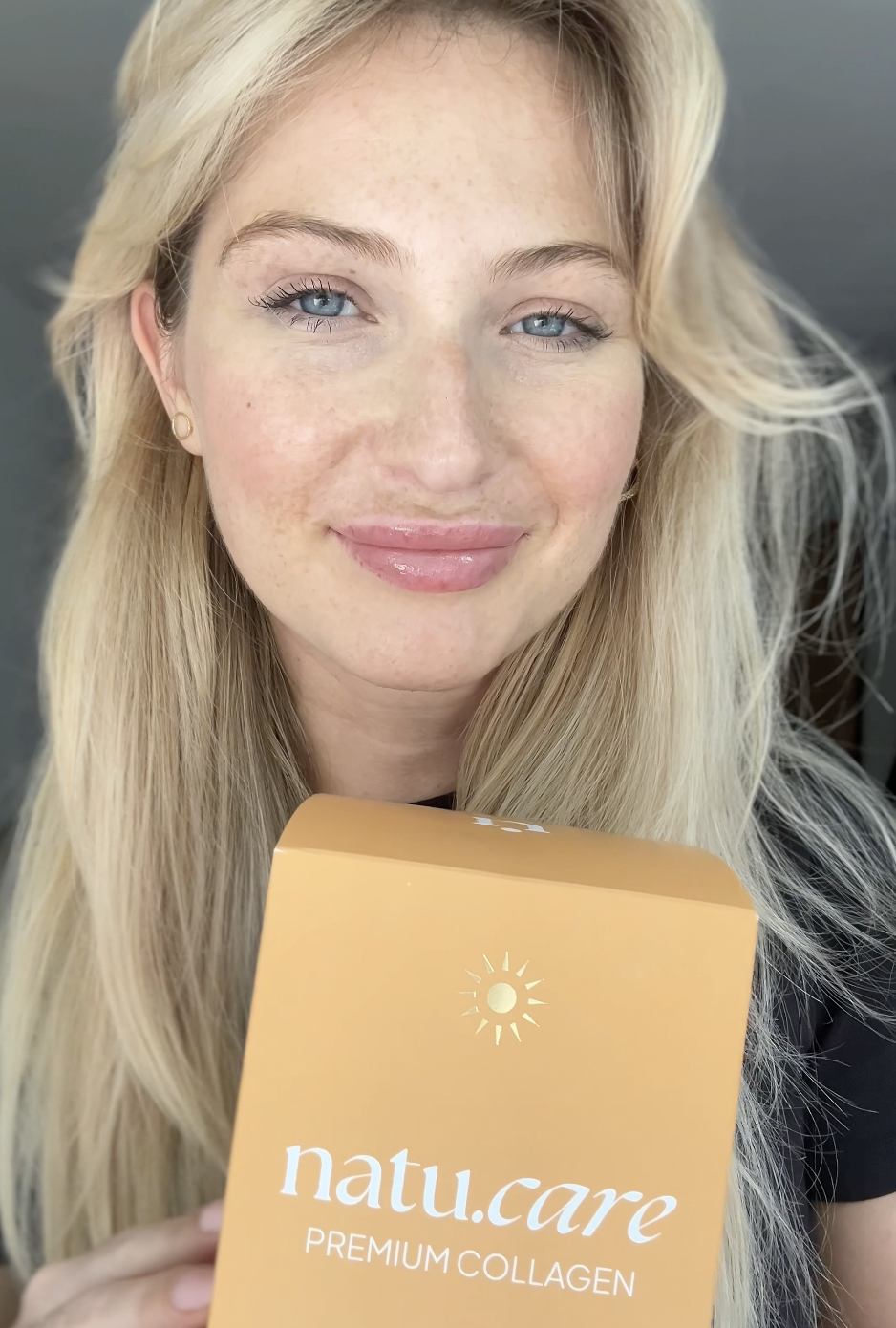
Wybrałam kolagen Natu.Care, ponieważ miał super opinie – a to było dla mnie bardzo ważne! Odkąd go stosuję, moja skóra znacznie się poprawiła i jest nawilżona, a na głowie pojawiły się nowe "baby hair".@Kasia S.
See also:
- Vitamin C for the face .
- Biotin [what it is + properties and side effects] .
- Biotin for hair [what it gives and effects + ranking]
- B vitamins [properties + where they occur] .
- Vitamin B1 (thiamine) [properties + where it occurs] .
- Vitamin B2 [properties + where it occurs] .
- Vitamin B3 [properties + where it occurs]
- Niacin [what it is + effects and side effects] .
- Vitamin B5 (pantothenic acid) [what it is + properties and excess] .
- Vitamin B6 [where it occurs + deficiency, excess and properties]
- Vitamin B9 (folic acid) [what it is + properties and excess] .
- Vitamin B12 [what it helps with + where it occurs] .
- Magnesium [what it is in + properties] .
- Best magnesium [ranking + pharmacist's opinion] .
What is vitamin C?
.
Vitamin C is a vitamin that is soluble in waterand. Has antioxidant properties - protects the body's cells from free radicals. It influences the wound healing process, is responsible for the immune system and prevents the body from ageing. Vitamin C is essential for the health ofand every human.
Left- and right-handedness - what is the difference?
.
Natural and actively biological vitamin C is L-ascorbic acidand. Upon hearing this name, the immediate thought that comes to mind is that it is a left-handed vitamin. This is a mistake. L-ascorbic acid (or vitamin C) is a right-handed compound. D-ascorbic acid, on the other hand, is left-handed. How is this possible?
The letter in front of the name of the acid refers to the spatial configuration of the molecule, not its optical torsion. Right-handed vitamin C has the L configuration, which is why it is called L-ascorbic acid. In contrast, left-handed D-ascorbic acid, often referred to as "left-handed vitamin C", is in fact not! This compound, apart from its antioxidant activity, has no biological activity - it has no effect on our bodies.
Where does vitamin C occur in the body?
.
The concentration of vitamin C in the body ranges from 300 mg (in the case of scurvy) to 2 gand. Its high concentration is maintained in:
- .
- cells, .
- tissues, .
- white blood cells, .
- eyes, .
- adrenal glands, .
- brain, .
In contrast, not very much vitamin C is found in fluids such as saliva and plasma.
Properties of vitamin C
.
Vitamin C influences a number of processes in our body. What are its most valuable properties?
.
Reduces the risk of chronic diseases
.
Vitamin C is a powerful antioxidant that strengthens the body's defence mechanismsand. The presence of free radicals in the body promotes oxidative stress . This condition leads to numerous chronic diseases such as amyotrophic lateral sclerosis and Alzheimer's disease . Studies suggest that long-term supplementation of vitamin C can increase antioxidant levels in the body by up to 30% .
Increases immunity
.
Vitamin C almost everyone associates it with its effect on immunity . It affects the immune system and protects the body from infections. Its deficiency negatively affects health outcomes. Research suggests, that people with pneumonia tended to have lower levels of vitamin Cand.
The immune system is formed until around the age of 12. The body of people below this age needs support in building the immune system itself, as it is not yet fully developed. Therefore, the help of vitamin C is essential and very important for children. Vitamin C influences the functioning of the immune system of the youngest by participating in immunomodulatory processes and also increases the activity of B and T lymphocytes, which take part in the body's immune reactions. Above the age of 12, the immune system already knows how to fight, we just need to give it a bit of a boost, an energy boost - this is where zinc comes in..
 .
.
Julia SkrajdaDietitian
.You may be interested in: Zinc - properties, occurrence, deficiency, excess
Protects memory
.
Dementia, also known as dementia, is a serious disease in which there is a progressive impairment of intellectual functionand. It affects 47 million people worldwide and mostly affects the elderly. Patients suffering from dementia not infrequently had lower levels of vitamin C in their bodies . Furthermore, research suggests that taking vitamin C positively affects thinking and memoryand.
Reduces the risk of heart disease
.
Heart disease is the leading cause of death worldwideand. A study of more than 293,000 people found that taking more than 700 mg of vitamin C daily for 10 years reduced the risk of heart disease by 25 per cent . Other studiesand suggest, that taking more than 500 mg of vitamin C per day for four weeks reduces cholesterol and triglycerides in the blood.
Omega acids also reduce the risk of heart disease. Want to learn more about them? You are invited to: Omega-3: characteristics, effects, use, types
.
And if you are looking for a product with omega-3 fatty acids, read: Ranking omega-3 tablets (20+ best)
Prevent iron deficiency
.
Iron is an essential nutrient responsible for the production of red blood cells and oxygen transport in the body. Supplements with vitamin C improve its absorption from the diet, particularly from plant sourcesand. This is important for vegetarians, as the largest deposits of iron are found in meat. Research suggests that consuming 100 mg of vitamin C improves iron absorption by 67 per cent .
Vitamin C increases calcium absorption. It is not the main factor in this process, but it plays a key role in it. Furthermore, vitamin C has a positive effect on the absorption of iron. So is this combination the key to a healthy body and mind? No. Vitamin C supplemented with iron could be 'too' well absorbed in the digestive tract. The result could be an excess of it in the body..
 .
.
Julia SkrajdaDietitian
..
Limits uric acid levels in the blood
.
Too much uric acid leads to goutand. This is a condition manifested by painful inflammation mainly in the big toes. Research suggests that people who consume high doses of vitamin C have lower uric acid levels in their blood. Furthermore, ascorbic acid supplementation reduces the risk of gout by 44%and.
Controls blood pressure
.
High blood pressure leads to heart disease - the most common cause of deathand worldwide. Preliminary research suggests that vitamin C supplementation reduces blood pressure . Although the results are promising, more research is needed to confirm the role of vitamin C in controlling blood pressure.
Vitamin C regulates blood pressure and inhibits the formation of atherosclerotic plaques (the main cause of atherosclerosis). Furthermore, it seals small blood vessels, thus preventing heart attacks. Vitamin C also supports thyroid function and lowers blood glucose levels..
 .
.
Julia SkrajdaDietitian
.Promotes collagen synthesis
.
Vitamin C is essential for the synthesis and maintenance of collagen in the bodyand. It acts as the "glue" that is responsible for binding collagen fibres together. Vitamin C in combination with collagen strengthens hair and nailsand.
How else does vitamin C work?
.
- .
- Reduces the risk of complications from the flu, such as pneumoniaand. .
- Limits the likelihood of stroke .
- Prevents skin aging . .
- Helps treat macular degeneration .
Vitamin C regulates steroid hormones - reducing levels of cortisol, adrenaline and pro-inflammatory cytokines, the proteins responsible for inflammation in the body. This is particularly useful for those involved in intense endurance sports. With strength training, on the other hand, the effect of supplementation with high doses of vitamin C may be impaired muscle protein synthesis. This leads to reduced muscle growth..
 .
.
Julia SkrajdaDietitian
.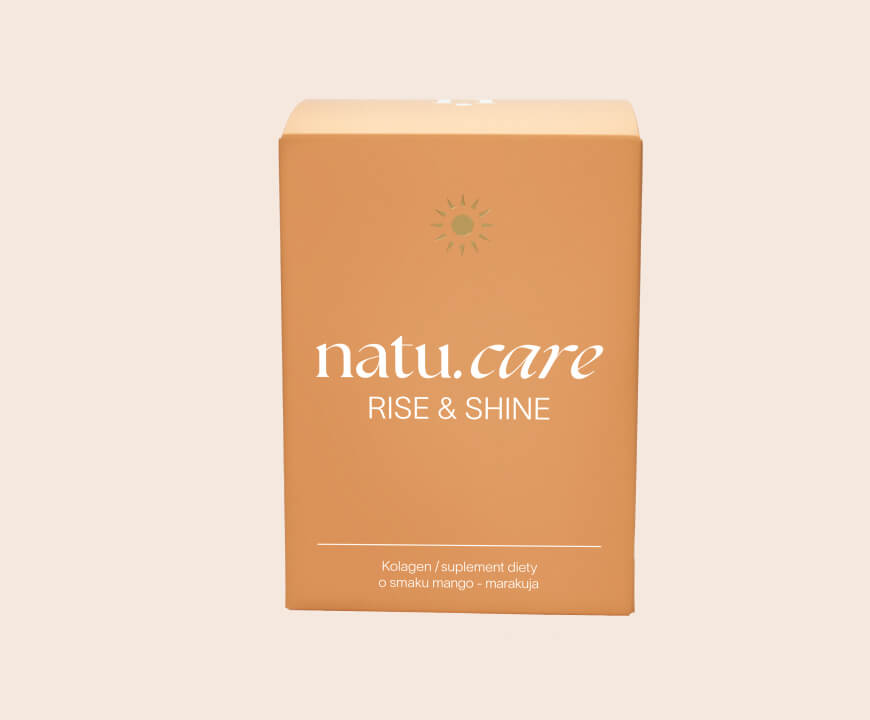
Rise&Shine: Collagen (5000 mg) in Mango-Maracuja flavour
Rise&Shine is collagen (5000 mg) in Mango-Maracuja flavour. Proven formulation, great bioavailability and refreshing taste.
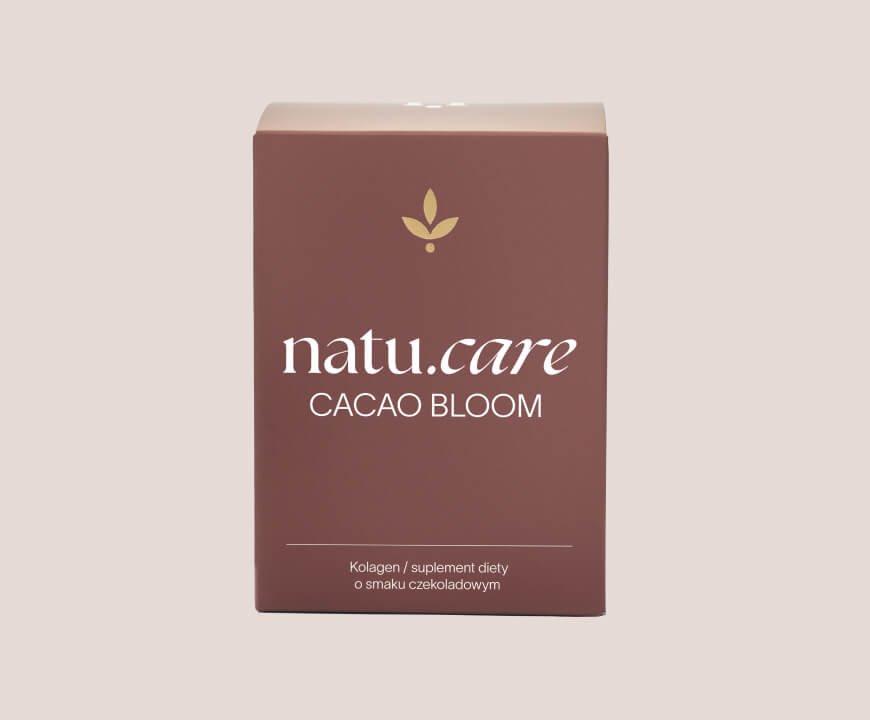
Cacao Bloom: premium collagen (5000 mg) with cocoa content
.Cacao Bloom is premium collagen (5000 mg) with Dutch cacao. A researched formulation, convenient dosage and unforgettable taste.
Myths about vitamin C
.
Vitamin C has many beneficial properties. However, its popularity has contributed to several myths. Which of these are often repeated, and completely untrue?
- Reduces cancer risk. Some people have certainly heard that vitamin C reduces cancer risk. However, this is not true. Studies have shown that vitamin C does not reduce the risk of cancer.
- Prevents the common cold. Vitamin C in the eyes of many people is linked to preventing infections. In fact, although vitamin C gently reduces the recovery time for infections, it does not prevent them.
- Protects against eye diseases. Cataracts or macular degeneration are dangerous eye diseases that vitamin C supposedly prevents . Ascorbic acid supplements do not protect against eye disease. What's more, they may even cause harm to our eyes .
- Cures lead toxicity. Some studies have shown that people with lead toxicity have low levels of vitamin C. However, it has not been shown to treat this condition.
In which products is vitamin C found?
.
Vitamin C most of us associate with lemon. Contrary to appearances, this fruit is not at all as rich in it as you might think. Which products contain the most vitamin C?
.
.
What destroys vitamin C?
.
Vitamin C is lost from foods by excessive heatand. Extended cooking times also negatively affect its content in food. Furthermore, vitamin C is water-soluble, so it often seeps into cooking liquids. If it is not absorbed in this form, its beneficial properties will be wasted.
How to preserve vitamin C in food?
.
Speed heating and using minimal water are proven methods of preserving vitamin C in foodand. Therefore, frying, blanching or cooking with a small amount of water can preserve vitamin C. However, raw foods are the richest in ascorbic acid.
Daily vitamin C requirements
.
The amount of vitamin C we should take each day depends on our age. What is the requirementand for vitamin C in children and adults?
Children
. .
|
Age |
Daily requirements* . |
|
0-12 months |
20 mg |
|
1-3 years |
40 mg |
|
4-9 years |
50 mg |
|
10-12 years |
50 mg |
|
13-18 years old girls |
65 mg |
|
13-18 years old boys |
75 mg |
*Nutrition standards for the Polish population
Adults
.
The requirement for vitamin C in adult men is 90 mg per day. In contrast, a daily intake of 75 mg is sufficient for women. Pregnancy and lactation are slightly different. Then 80-85 mg and 115-120 mg should be taken, respectively. A lower dose is sufficient for teenagers, while adult women should opt for the higher dose.
.
Maximum dose
.
Vitamin C is usually not toxic to healthy individuals. Nevertheless, taking too much of it causes side effects. What are the healthy limits of vitamin C supplementation?"
.
|
Age . |
Maximum daily doseand |
|
1-3 years |
400 mg |
|
4-8 years |
650 mg |
|
9-13 years |
1200 mg |
|
14-18 years |
1800 mg |
|
19 years + |
2000 mg |
Best vitamin C supplements
.
Vitamin C deficiency
.
Vitamin C deficiency is rare. Most of us provide it with our diet. What leads to a lack of vitamin C in the body?
.
Cause
.
The availability of fresh produce rich in vitamin C is unproblematic in developed countries. Despite this, vitamin C deficiency still affects approximately 7% of American adultsand. In addition to poor diet, a lack of vitamin C is also influenced by lifestyle and various medical conditions.
Cause of vitamin C deficiency:
.
- alcoholismand, .
- smoking , .
- anorexia ,
- mental illnesses ,
- dialysis , .
Symptoms
.
Most often the body lets us know when something bad is happening. Vitamin C deficiency is no different. When should the red light go on for us?
Weakened immunity
.
Vitamin C is associated by most of us with immunityand. Ascorbic acid accumulates in numerous immune cells to fight infection. Deficiency of vitamin C weakens immunity , and increases the risk of illness, such as pneumonia .
Poor immunity is also affected by vitamin A deficiency. Would you like to read more about it? Take a look at my article: Vitamin A - properties, effects, occurrence, deficiency symptoms
Rough skin
.
Vitamin C is responsible for the production of collagenand. Called the protein of youth, collagen is responsible for the health of skin, hair, joints and bones. Low levels of vitamin C lead to skin deterioration . It manifests follicular keratosis , and also dries it out .
You may be interested in:Facial collagen - ranking, effects, use [TOP 10]
.
Slower wound healing
.
Limited collagen production due to vitamin C deficiency leads to slower wound healingand. In extreme cases lack of adequate levels of vitamin C can even result in old wounds opening up . Ascorbic acid deficiency also increases the risk of infection.
Want to know what a lack of collagen in the body results in? Take a look at my article on collagen deficiency!
Weakened bones
.
Vitamin C deficiency also affects bone healthand. It leads to an increased risk of fractures , as well as osteoporosis. Vitamin C is responsible for the structure of the bone skeleton. Its deficiency is particularly dangerous for children who are growing and developingand.
Joint pain
.
Joint pain is another symptom of vitamin C deficiency linked to collagen . Research suggests that in some cases the pains were so severe that people with vitamin C deficiencies became limp or had difficulty walking . Furthermore, sometimes there was also bleeding, which caused swelling and additional pain.
You may be interested in: Collagen for joints - effects, forms, use, reviews
Breaking bruises
.
Breaking bruises are the result of bursting blood vessels. Frequent formation of bruises is one of the signs of vitamin C deficiencyand. They can cover large areas of the body or appear as small, purple dots under the skin.
Gingival bleeding
.
Red, swollen and bleeding gums are another symptom suggesting that your body is demanding vitamin C . Lack of adequate levels of ascorbic acid leads to inflammation and weakened gums . In an advanced stage of deficiency, the gums may even appear purple and rotten.
Other symptoms of vitamin C deficiency:
.
- fatigueand, .
- oxidative stress ,
- worse mood , .
Vitamin C deficiency results in decreased appetite, poor immunity and broken blood vessels..
Dr Katarzyna GrudzieńAesthetic medicine physician

Rise&Shine: Collagen (5000 mg) in Mango-Maracuja flavour
Rise&Shine is collagen (5000 mg) in Mango-Maracuja flavour. Proven formulation, great bioavailability and refreshing taste.

Cacao Bloom: premium collagen (5000 mg) with cocoa content
.Cacao Bloom is premium collagen (5000 mg) with Dutch cacao. A researched formulation, convenient dosage and unforgettable taste.
Excess vitamin C
.The body does not produce or store vitamin Cand. It is therefore very important to provide it daily with the diet. Nevertheless, supplementation with large amounts of vitamin C can lead to negative effects.
If you use higher doses of vitamin C than recommended, this substance can falsify the results of certain tests performed by oxido-reduction methods. These include the determination of blood glucose, creatinine, AspAT and lactate dehydrogenase levels..
 .
.
Julia SkrajdaDietitian
.Symptoms of excess vitamin C:
.- headachesand, .
- diarrhoea ,
- nausea ,
- vomiting ,
- gravity ,
- abdominal pain , .
In the long term, excess vitamin C can lead to the development of kidney stones in men, as well as liver problems . Moreover, some studies suggest that too much vitamin C intake from supplements may result in a greater risk of heart disease in postmenopausal women with diabetes .
.See also:
.- The liver [symptoms of diseases + how to care for it and what to avoid] .
- Fatty (oily) liver [what it is + causes + symptoms] .
- Liver tests [what they are + when to perform] .
- Liver supplements [ranking + pharmacist's opinion]
- Tablets for the liver [ranking + pharmacist's opinion] .
Vitamin C intake above 2,000 mg per day may, in predisposed individuals, be an initiating factor in the precipitation of oxalate-calcium stones in the urine. This can result in nephrolithiasis. Furthermore, long-term use of high doses of vitamin C in the form of supplements, may result in lower selenium and copper concentrations..
 .
.
Julia SkrajdaDietitian
.Vitamin C - supplementation
.Most often, vitamin C supplementation is not necessary. Most of us take it with our diet. However, if you think you are deficient in it, it is worth choosing one of the supplements. Remember that healthy supplementation should be recommended by your doctor.
Supplemented vitamin C fights free radicals and also affects the condition of the skin and internal organs. Vitamin C can also be administered in the form of a cream. It then influences the production of collagen. This results in tighter and smoother skin. Vitamin C in this form also affects vascular tightness and fights acne..
Dr Katarzyna GrudzieńAesthetic medicine physician
Who shouldn't take?
.In people who are prone to stress and also suffer from stomach problems, vitamin C should not be taken on an empty stomach. It can irritate the gastric mucosa, increasing the secretion of gastric acids and consequently exacerbating these complaints. People with stomach problems should be particularly careful when it comes to vitamin C supplementation. More often than not, none of us should take it on our own, without a doctor's recommendation..
 .
.
Julia SkrajdaDietitian
.What time of day to take it
.Vitamin C is a very valuable water-soluble nutrient. It is this characteristic that makes it worth taking it in the morning, still on an empty stomach (if you have no problems with it)and. It is best to do this about 30-40 minutes before your first meal. This is when you will use the full potential of vitamin C.
Note!
.Do not use vitamin infusions. Doctors are sounding the alarm that these practices are ineffective and dangerous.
People take vitamin C like candy, which is why side effects of vitamin C overdose are often observed. The most common of these is impaired blood clotting. It is over-stimulated, resulting in the formation of clots, which can lead to venous congestion..
 .
.
Julia SkrajdaDietitian
.Vitamin C in pregnancy
.Vitamin C is essential for the proper development of pregnancyand. It supports the immune system and also improves the absorption of iron. Furthermore, vitamin C supplementation during pregnancy reduces the risk of complications such as pre-eclampsia and intrauterine growth retardation. Ascorbic acid also prevents anaemia in the mother-to-be.
Vitamin C and breastfeeding
.Vitamin C is one of the components of human milkand. It is one of the main antioxidants. Breastfeeding women should increase their vitamin C intake to 120 mg per day. Most often a healthy diet is sufficient, supplementation is rarely necessary.
Note!
.Supplementation of vitamin C during pregnancy and during breastfeeding should only be recommended by a doctor.
Vitamin C and alcohol
.Alcohol is the seventh leading risk factor for death worldwide. Long-term consumption of alcohol negatively affects the absorption of vitamin C by the pancreas . This can lead to inflammation and other conditions of this organ.
Interactions of vitamin C with drugs
.Vitamin C may interact with medications. Individuals taking certain medications on a regular basis should exercise caution when taking vitamin C.
Agents reacting with vitamin C:
.- .
- statinsand, .
- niacin , .
- estrogens , .
- warfarin , .
Vitamin C attenuates the effects of anticoagulants, as well as antipsychotics used to treat schizophrenia and aminoglycoside antibiotics. It does not stop there, it facilitates and accelerates the absorption of certain heavy metals including lead (Pb), cadmium (Cd), copper (Cu) and aluminium (Al), and exacerbates their toxicity..
 .
.
Julia SkrajdaDietitian
.Caution!
.If you are taking these or other medications, advise your doctor. Only he or she can recommend a healthy as well as effective supplementation.
See also:
- Collagen [properties + dosage] .
- Drinking collagen [properties + ranking] .
- Drinking collagen [effects + side effects] .
- Facial collagen [effects + ranking]
- Marine collagen [properties + ranking]
- Collagen for skin [ranking] .
- Collagen for joints [action + forms] .
- Collagen for hair [properties + effects]
- Collagen for wrinkles [ranking] .
- Fish collagen [effects + actions] .
- Most powerful collagen [ranking + types]
- Collagen deficiency [causes + symptoms] .
Summary
.Remember:
.- Vitamin C is a water-soluble vitamin.
- Vitamin C is a water-soluble vitamin.
- Increasing immunity, lowering the risk of heart disease, or controlling blood pressure are some of the properties of vitamin C. .
- Vitamin C does not prevent the common cold and does not reduce the risk of cancer. .
- The highest levels of vitamin C are found in the kakadu plum, acerola and rosehip. .
- The daily requirement for vitamin C is 90 mg in men and 75 mg in women. .
- The maximum dose of vitamin C that does not cause side effects is 2000 mg. .
- Reduced immunity, skin problems or joint pains may be indicative of a vitamin C deficiency. .
- Excess vitamin C manifests itself through nausea, headaches or vomiting. .
- Vitamin C can react with some medications. .
FAQ
.When not to take vitamin C?
.Preparations with high doses of vitamin C (1000 mg or more) should not be taken by children under 12 years of age. High doses of vitamin C are not recommended during chemotherapy, while taking anticoagulants, antiviral drugs. In addition, vitamin C supplements should not be used by people with haemochromatosis, a condition in which too much iron accumulates in the body, and vitamin C helps with the absorption of this element.
How to use vitamin C on your face
.Vitamin C is one of the most powerful antioxidants for slowing down the skin ageing process. The best and safest way would be to use ready-made cosmetics with vitamin C - face creams, eye creams, wrinkle creams or face cheeses.
You can also make your own cosmetics from semi-finished products, but you will find it difficult to get the right concentration.
Can I take vitamin C every day?
.According to Polish dietary standards, the daily recommended dose for an adult is 75-90 mg per day. It is best to provide it with your diet - you only need to eat about 100g of kale or 50g of yellow peppers.
The maximum daily dose for adults is 2000 mg. Long-term intake of higher amounts can lead to headaches, diarrhoea, vomiting, as well as kidney stones, heart disease or problems with the liver.
With what is vitamin C best absorbed?
.If you want to improve vitamin C absorption, take it along with foods rich in vitamin A, B vitamins, vitamin E, calcium, magnesium, bioflavonoids and zinc.
.Does vitamin C cleanse the liver?
.The properties of vitamin C suggest that it may help to maintain liver health and regeneration - particularly by protecting cells from oxidative stress. Vitamin C supports the production of collagen, which is an important component of connective tissue and forms a protective layer around the organs. In addition, vitamin C helps to cleanse the liver of excess fats. Also check out: Fatty liver - symptoms and treatment
.Does vitamin C affect menstruation?
.Contrary to popular belief, vitamin C does not accelerate or delay your period. However, it can help to alleviate menstrual symptoms. Vitamin C strengthens blood vessels. One study suggests that regular intake of 200 mg of vitamin C and 200 mg of flavonoids resulted in less bleeding during the period in more than half of the women studied.
Does vitamin C acidify the body?
.Regular intake of vitamin C does not acidify the body and does not alter the pH of the blood. However, products rich in vitamin C can acidify the urine. Excess acid formed in food is excreted by the kidneys, which is beneficial for maintaining the acid-base balance in the body. This phenomenon also helps to treat bacterial bladder infections. The bacteria that are responsible for them will not thrive when the pH is lowered.
Sources
See all
.Alessio, H. M., Goldfarb, A. H., & Cao, G. (1997). Exercise-Induced Oxidative Stress before and after Vitamin C Supplementation. International Journal of Sport Nutrition and Exercise Metabolism, 7(1), 1-9. https://doi.org/10.1123/ijsn.7.1.1
Algahtani, H. A., Abdu, A. P., Khojah, I. M., & Al,-Khathaami Ali M. (2010). Inability to walk due to scurvy: A forgotten disease. Annals of Saudi Medicine, 30(4), 325-328. https://doi.org/10.4103/0256-4947.65266
Arvanitakis, Z., Shah, R. C., & Bennett, D. A. (2019). Diagnosis and Management of Dementia: Review. JAMA, 322(16), 1589-1599. https://doi.org/10.1001/jama.2019.4782
Asmat, U., Abad, K., & Ismail, K. (2016). Diabetes mellitus and oxidative stress-A concise review. Saudi Pharmaceutical Journal, 24(5), 547-553. https://doi.org/10.1016/j.jsps.2015.03.013
Bakaev, V. V., & Duntau, A. P. (2004). Ascorbic acid in blood serum of patients with pulmonary tuberculosis and pneumonia. The International Journal of Tuberculosis and Lung Disease: the Official Journal of the International Union Against Tuberculosis and Lung Disease, 8(2), 263-266.
Boyera, N., Galey, I., & Bernard, B. a. (1998). Effect of vitamin C and its derivatives on collagen synthesis and cross-linking by normal human fibroblasts. International Journal of Cosmetic Science, 20(3), 151-158. https://doi.org/10.1046/j.1467-2494.1998.171747.x
Bsoul, S. A., & Terezhalmy, G. T. (2004). Vitamin C in health and disease. The Journal of Contemporary Dental Practice, 5(2), 1-13.
Cardiovascular diseases (CVDs). (n.d.). Retrieved March 17, 2023, from https://www.who.int/news-room/fact-sheets/detail/cardiovascular-diseases-(cvds)
Carr, A. C., & Maggini, S. (2017). Vitamin C and Immune Function. Nutrients, 9(11), Article 11. https://doi.org/10.3390/nu9111211
Chambial, S., Dwivedi, S., Shukla, K. K., John, P. J., & Sharma, P. (2013). Vitamin C in Disease Prevention and Cure: An Overview. Indian Journal of Clinical Biochemistry, 28(4), 314-328. https://doi.org/10.1007/s12291-013-0375-3
Fraser, I. M., & Dean, M. (2009). Extensive bruising secondary to vitamin C deficiency. Case Reports, 2009, bcr0820080750. https://doi.org/10.1136/bcr.08.2008.0750
Galimberti, F., & Mesinkovska, N. A. (2016). Skin findings associated with nutritional deficiencies. Cleveland Clinic Journal of Medicine, 83(10), 731-739. https://doi.org/10.3949/ccjm.83a.15061
Gerster, H. (1999). High-dose vitamin C: A risk for persons with high iron stores? International Journal for Vitamin and Nutrition Research. Internationale Zeitschrift Fur Vitamin- Und Ernahrungsforschung. Journal International De Vitaminologie Et De Nutrition, 69(2), 67-82. https://doi.org/10.1024/0300-9831.69.2.67
Ghanwat, G., Patil, A. J., Patil, J., Kshirsagar, M., Sontakke, A., & Ayachit, R. K. (2016). Effect of Vitamin C Supplementation on Blood Lead Level, Oxidative Stress and Antioxidant Status of Battery Manufacturing Workers of Western Maharashtra, India. Journal of Clinical and Diagnostic Research : JCDR, 10(4), BC08-BC11. https://doi.org/10.7860/JCDR/2016/15968.7528
Gulko, E., Collins, L. K., Murphy, R. C., Thornhill, B. A., & Taragin, B. H. (2015). MRI findings in pediatric patients with scurvy. Skeletal Radiology, 44(2), 291-297. https://doi.org/10.1007/s00256-014-1962-y
Hemilä, H. (2017). Vitamin C and Infections. Nutrients, 9(4), 339. https://doi.org/10.3390/nu9040339
Hirschmann, J. V., & Raugi, G. J. (1999). Adult scurvy. Journal of the American Academy of Dermatology, 41(6), 895-906; quiz 907-910. https://doi.org/10.1016/s0190-9622(99)70244-6
Huijskens, M. J. A. J., Walczak, M., Koller, N., Briedé, J. J., Senden-Gijsbers, B. L. M. G., Schnijderberg, M. C., Bos, G. M. J., & Germeraad, W. T. V. (2014). Technical Advance: Ascorbic acid induces development of double-positive T cells from human hematopoietic stem cells in the absence of stromal cells. Journal of Leukocyte Biology, 96(6), 1165-1175. https://doi.org/10.1189/jlb.1TA0214-121RR
Iizaka, S., Nagata, S., & Sanada, H. (2017). Nutritional status and habitual dietary intake are associated with frail skin conditions in community-dwelling older people. The Journal of Nutrition, Health & Aging, 21(2), 137-146. https://doi.org/10.1007/s12603-016-0736-8
Juraschek, S. P., Guallar, E., Appel, L. J., & Miller, E. R., III. (2012). Effects of vitamin C supplementation on blood pressure: A meta-analysis of randomized controlled trials. The American Journal of Clinical Nutrition, 95(5), 1079-1088. https://doi.org/10.3945/ajcn.111.027995
Kohgo, Y., Ikuta, K., Ohtake, T., Torimoto, Y., & Kato, J. (2008). Body iron metabolism and pathophysiology of iron overload. International Journal of Hematology, 88(1), 7-15. https://doi.org/10.1007/s12185-008-0120-5
.Editorials
Meet the team


Editor
Graduate of Journalism and Artes Liberales at the University of Warsaw. Since 2017, he has been working with the biggest portals in Poland and abroad as an editor. Previously worked for 3 years in one of the leading pharmaceutical companies - he knows the health and beauty industry inside out. In his free time, he most enjoys playing tennis or skiing.
![Vitamin B12 - where it occurs in the diet and in products [table].](https://cdn-resources.natu.care/uploads/1/balanced_diet_nutrition_healthy_eating_concept_food_sources_rich_vitamin_b12_cobalamin_kitchen_table_1_b84f75bda2.jpg)
Find out where vitamin B12 is found and which products will provide you with it.

Vitamin PP also known as niacin or vitamin B3 supports the proper functioning of the body.
![What is NMN? Effects, effects, side effects [supplements].](https://cdn-resources.natu.care/uploads/1/science_background_with_molecule_atom_abstract_structure_science_medical_background_3d_illustration_1_a5ec4d9cec.jpg)
Everything you want to know about NMN: properties, effects, safety and expert opinions.
